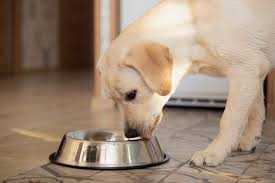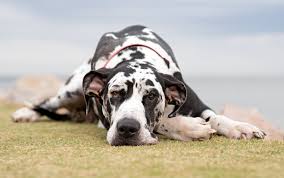
Without a doubt, the creamy pasta dish Alfredo is delicious, but can dogs safely eat the sauce?
In short, dogs must not eat Alfredo sauce since its primary ingredients are extremely harmful to them. It might result in a number of health issues including difficulties with the digestive system, pancreatitis, food poisoning, lactose malabsorption, obesity, hemolytic anemia, hypernatremia, or heart disease.
Keep reading below as we discuss these problems in more detail.
Before you scroll down to a more in-depth answer to this question, “Can Dogs Eat Alfredo Sauce,” check out: Why Does My Dog Roll Around After Eating? 8 Reasons! (2023) and Why Won’t My Dog Eat in the Morning? Vet Advice! (2023).
Can Dogs Eat Alfredo?

Your dogs should never be allowed to eat Alfredo because the ingredients used to create this dish can prove harmful both in the long and short run. It might result in a number of health issues.
Ingredients in Alfredo That Are Harmful

The following ingredients in Alfredo can prove harmful to your dog:
Heavy Cream

Alfredo is adored by many people for its creamy flavor, which is achieved with heavy cream. However, this one specific Alfredo ingredient could cause issues for dogs.
Heavy cream and other dairy products are toxic to dogs that cannot tolerate lactose. These dogs will have a difficult time digesting it as a result.
A dog’s stomach may ferment due to an excessive amount of lactose. It can cause stomach ailments and excessive gas production.
Parsley
Parsley is frequently used as a culinary flavor and garnish. However, a substance in parsley — commonly referred to as furanocoumarin — can potentially harm dogs. An overdose might even be fatal to a puppy.
Therefore, it’s advisable to be cautious with how much parsley your dog eats. Because of this, you should be careful about how much parsley you give your dog. The recommended dosage for your dog is 1 tsp (4.2 g) per 20 pounds (9 kg) of body weight.
If used in moderation, parsley may have positive health effects. Actually, it’s well-known as a super-herb for a dog’s diet. Several advantages of parsley include:
- Vitamin C: Enhances immunity
- Vitamin K: Promotes healthy liver function and blood flow.
- High chlorophyll content: Improves the breath of dogs.
- Vitamin A: Improves eyesight, reproduction, and organ function.
Black Pepper

Want to add some heat to your Alfredo? Add some black pepper! But hold on — if consumed in large amounts, black pepper may be hazardous for dogs.
Your dog could also breathe some of it in when smelling the Alfredo, considering that dogs frequently smell their food before eating it. It can cause your dog’s nose to get irritated as a result, making them sneeze uncontrollably.
Butter
For dogs, butter is not poisonous. However, it shouldn’t be a regular part of their diet.
Butter is a dairy product, which is a no-go for dogs that cannot tolerate lactose. Additionally, it has 80 percent unsaturated fat, which could result in obesity and weight gain. There’s also a risk of pancreatitis.
Salt

Some people might believe a tiny amount of salt won’t hurt pets. But you might notice your dog pacing after consuming Alfredo sauce, or frantically trying to find something to drink. The reason is that 1 tsp of salt is enough to produce an extreme thirst in a dog. When consumed in higher amounts, it might even cause sodium ion toxicity.
Parmesan Cheese
The processes used to make cheese vary according to the type. For instance, parmesan cheese is created with a high salt concentration. As already stated, this is bad for a dog’s health. Although there is very little lactose in parmesan cheese compared to other kinds of cheese, it could be simpler for dogs to digest. However, if consumed in large quantities, dogs might still have gastrointestinal distress.
Onion and Garlic

For our canine and feline friends, this pair is a huge no-no. Thiosulfate is present in onions and garlic, which results in clumping in the red blood cells. Small pieces of garlic and onions may give dogs gas, whereas it could be fatal in large doses, similar to giving anemia and heart failure a root.
What Happens if My Dog Eats Alfredo?

If your dog eats Alfredo, it can cause a number of health issues, such as:
1. Digestive Problems

Ingredients in Alfredo sauce, such as parmesan cheese, black pepper, and parsley, could be the cause of canine gastrointestinal issues, as already indicated. In addition, dogs may have trouble absorbing the nutrients in their meals. As a result, they could feel unwell.
The following are a few examples of the digestive issues that the aforementioned ingredients may cause:
Indigestion
This issue occurs when a dog’s digestion is compromised, which might be brought on by eating too much, eating many different kinds of foods at once, or eating foods that are inappropriate for dogs.
Additionally, a dog with digestive problems may be seen chewing grass. This is a natural instinct for dogs that allows them to settle their stomachs, providing relief by making them puke or poop.
Gastric Dilatation-Volvulus (GDV)

GDV is the term used in medicine to describe bloating. Dogs experience it when their tummies twist and flip. This may be brought on by gas, liquid, or certain meals like Alfredo sauce.
All dog owners must be aware of this digestive issue because if the problem worsens, it can be fatal. Bloating will put a strain on a dog’s veins and major arteries. As a result, the stomach’s blood supply will be cut off. Toxins will then start to accumulate, which might result in the tissue dying.
Canine Colitis
This kind of canine digestive issue is associated with inflammation of the large intestine. Dogs with colitis will have watery feces. Additionally, it could contain trace amounts of blood. Colitis can cause dogs to feel anxious and urinate often. Furthermore, they could vomit a lot as well.
2. Pancreatitis

Pancreatitis is frequently brought on by fatty meals, like Alfredo, which has butter, heavy cream, and parmesan cheese. Simply put, your dog’s pancreas becomes inflamed, which results in a reduction in the production of enzymes. Enzymes are essentially a chemical that aids in food digestion.
3. Food Poisoning

Food poisoning in dogs can have devastating effects. This in itself should worry most owners, but the gravity of this illness varies. It really depends on the kind and quantity of poisonous food that your dog ate. Let’s now examine when a specific Alfredo component turns toxic:
Garlic and Onion Toxicity
Nearly all dishes made by humans contain garlic and onions. There are numerous different types of Alfredo sauces, yet most of them are sure to contain onions and garlic.
Sodium-Ion Poisoning

Eating too much salt can lead to salt toxicity. If this occurs, your dog could exhibit symptoms such as:
- Tremors
- Seizures
- Diarrhea
- Vomiting
- Lethargy
4. Malabsorption of Lactose

Lactose malabsorption is related to a sensitivity to lactose or the stomach’s inability to digest dairy sugars. In this case, you need to pay attention to the dairy content of Alfredo’s ingredients such as butter, parmesan, and heavy cream.
A healthy dog’s lactose consumption has limitations as well. For every 2.2 lbs (1 kg) of body weight, they can tolerate 0.07 oz (2 g) of lactose. For instance, if you own a lactose-tolerant 17.6 lb (8 kg) dog, your furry friend can consume 0.49 oz (14 g) of dairy products.
5. Obesity

In addition to lactose malabsorption in Alfredo, dairy products might contribute to weight gain. This is brought on by their highly nutritious fat content.
Your dog may gain weight at first. And if care is not given to them right away, they might quickly grow obese. You should act if this happens, as it could shorten your dog’s life as well as impact its health.
Frequently Asked Questions
You shouldn’t panic if your dog happens to eat creamy pasta sauce. That said, due to unhealthy ingredients that will upset its stomach — and potentially cause long-term health issues like pancreatitis — you should never intentionally feed your dog pasta sauce.
Dogs can consume cooked pasta like fettuccini without sauce, but it should not be a recurring treat due to its high amount of carbohydrates.
Pasta is not good for your dog’s overall diet, but it’s okay if your dog snatches your meal.
Conclusion for “Can Dogs Eat Alfredo Sauce”

To ensure your dog lives a long and healthy life, always strive to feed them safe food with healthy ingredients. In general, it is not recommended to feed your dog human food — especially not meals that can cause problems like pasta dishes with Alfredo sauce.
If you find this guide, “Can Dogs Eat Alfredo Sauce,” helpful, check out:
Before you feed your dog anything else, learn more by watching “Are Organic or Raw Food Diets Better for Your Pet? – Ask A Vet” down below:
Garrett loves animals and is a huge advocate for all Doodle dog breeds. He owns his own Goldendoodle named Kona. In addition, he volunteers at the Humane Society of Silicon Valley, where he fosters dogs and helps animals. Garrett enjoys writing about Doodles and believes that dogs can teach humans more about how to live than humans can teach a dog.
Why Trust We Love Doodles?
At We Love Doodles, we’re a team of writers, veterinarians, and puppy trainers that love dogs. Our team of qualified experts researches and provides reliable information on a wide range of dog topics. Our reviews are based on customer feedback, hands-on testing, and in-depth analysis. We are fully transparent and honest to our community of dog owners and future owners.